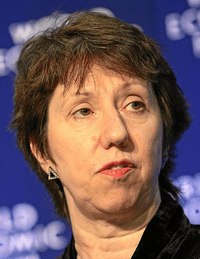The European Union's foreign policy chief, Catherine Ashton, and Iran's top nuclear negotiator, Saeed Jalili, are currently involved in a diplomatic dance over resuming talks on Tehran's nuclear program. If the talks do indeed come to fruition, Ashton could assume the negotiating role previously played by her predecessor, Javier Solana. While Solana's diplomatic efforts ultimately did not bear fruit (.pdf), the circumstances that hampered his attempts to resolve the Iranian nuclear standoff -- namely, the lack of U.S. participation and Iranian perceptions that the country had little to gain by talking with Europe -- have since improved and could be capitalized on by Ashton.
The current opportunity for negotiations follows a period of increased tensions between Iran and much of the international community. Only days after the U.N. Security Council adopted Resolution 1929 on June 9, which slapped another round of sanctions on Iran for not complying with international nonproliferation rules, Ashton addressed a letter to Iran calling for the resumption of talks between the P5+1 (the five permanent Security Council members plus Germany) and Iran, and inviting Jalili to meet and "discuss nuclear weapons issues and to take forward the twin-track approach." The letter followed months of similar overtures from Ashton. Although Jalili's July 7, 2010, response denounced the new sanctions, other Iranian officials have maintained that they are open to negotiations with the West.
Solana's efforts at negotiating with the Iranians -- especially in the E3/EU format (Great Britain, France, Germany and the EU) that ended in 2006 -- were significantly handicapped by the absence of productive U.S. contributions. In an interview, Avis Bohlen, former U.S. assistant secretary of state for arms control and American ambassador to Bulgaria, stated that "clearly there was very little chance of [success for the E3/EU-Iran negotiations] without U.S. involvement."

